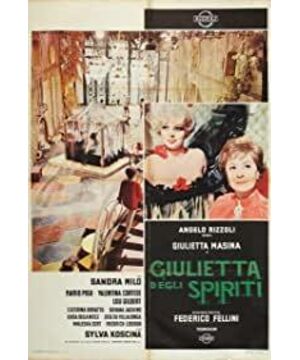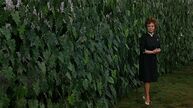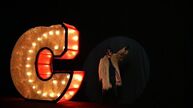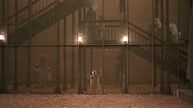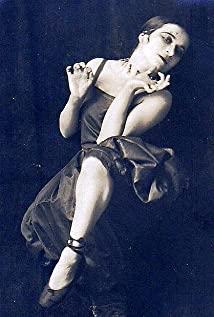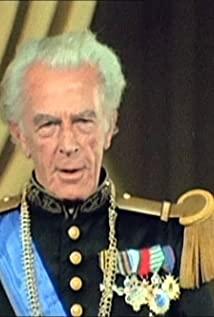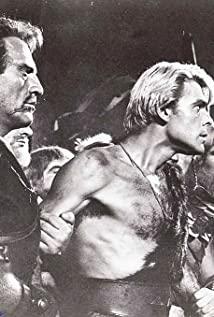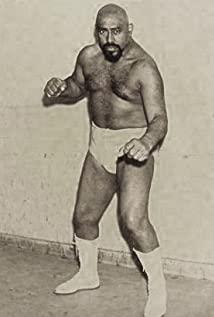- Fellini
"Juliet and the Genie" was Fellini's first film in color. The heroine in the movie is tailor-made for his wife Juliette.
At this time, Julieta and Fellini had been married for many years. She was no longer the jovial look of the busker girl on the road. It is worth noting that the timid expression she had when she was young has remained on her face. She becomes a timid middle-aged woman, or in Fellini's own words: she retains a quality that is a mixture of mystery and innocence.
Juliet in the film is a housewife who tries to smile at everything and wants to spend a romantic wedding anniversary with her husband. But things backfired, the husband called a large group of guests. This also includes a psychic. From this evening Juliet began to see all kinds of visions. When she was a little girl, she used to see many pictures when she closed her eyes. These pictures came back to the middle-aged woman's eyes again. At this time, she found that her husband was calling another woman's name in his sleep, and that her infinitely dependent husband had an affair. "I seem to have lost something since last night," she said. The world of safety begins to crumble, and the illusion turns into a nightmare.
Giulietta herself wasn't too keen on the role, disagreeing with how she was portrayed in the film and how Fellini demanded of acting. The daydreams in the film are also not hers, but from Fellini: huge naked women, raucous circuses, ships at sea, grandfathers who eloped with beautiful young actresses. During that time, Fellini often participated in some hypnotic activities of psychic mediums. Jung's psychological theory greatly influenced his creation. Fellini said: For Freud, the symbol represents the hidden things - because they are shameful. But for Jung, symbols represent things that cannot be expressed in words. Jung's theory made Fellini more firm in his creative direction. Starting from the film "Eight and a Half", he gradually abandoned the traditional way of narration, and infinitely enlarged his dreams to the screen, and firmly believed that dreams are the only reality. . Such attempts are brought to an extreme in the movie *Women's City*. In the film *Juliet and the Genie*, Fellini also tries to erase the boundaries between life scenes and dreams.
Who of us has the courage to dig our own dreams? Dreams can be mundane, adventurous, travel back in time, travel into the future, bring ecstasy and sometimes deep shame. Why did Fellini put his dream on a frustrated middle-aged housewife? Perhaps a clue can be seen in a sentence he himself said: When I am between films, I have to face my actual problems - God, money, Juliet, money, taxes, money! No wonder I would find a way to escape to the "playground" of Cinema City. Clearly, the Tower of Juliet is a problem. Taxes and money Fellini did not discuss in the film, but God and Giulietta were the themes he talked about many times in the film. The Tower of Juliet is the tip of the iceberg, and what is silent in the depths of the sea is Fellini's thinking about the relationship between the sexes.
Juliet looks hopelessly at the loss of love in marriage in the film, it's just that most people quickly find a replacement for affection in their lives. These women walk on every ordinary street in the world, and their daily life divides time into small grids, each of which can be easily filled by habit alone. But the elves ripped Juliet alive from self-sufficiency. Beneath the stability and tranquility lies a lie that dare not face him. Most people live on the lies and illusions that they weave like this. As the private detective in the film said: if you know it, you have to endure sin, and most people lack the ability to save themselves.
When Juliet escapes from the neighbor's party, a small red figure is in the back, and in the foreground is a huge stone sculpture of a bird's head. The stone figures are reminiscent of Magritte's paintings of owls growing from leaves. It's just that in Fellini's fantasy, the lower half of the eagle is a plump woman. The men in Fellini's films, hesitant, skeptical, and self-centered, have an eternal longing for women. This vision includes not only sexual attraction, but also tolerance and pure yearning for women's nature. For the ending of the film, Fellini and his wife have two very different views. Julieta believes that if a woman finds out that her beloved husband is cheating, the blow is too great. In the film, Juliet should deceive herself and continue to live like ordinary women. And Fellini lets Juliet rescue her from her own nightmare.
The first time I saw this movie was in the *Arsenal* in Berlin, and I remember a few moments when I sat upright at a certain image. Who can accurately explain these dreams? For a long time after watching the movie, I often think of another scene. At the end of the movie: Juliet wakes up in the morning, and the nightmares of last night are gone. She is standing in front of the door of the house, which is a panoramic view, a woman can be seen standing in front of the door, the big tree in front of the house is green, and the sun makes some slight yellowish in the air. She stood in front of the door, stretched out her arms, and took a deep breath.
It was a moment of relief.
View more about Juliet of the Spirits reviews


